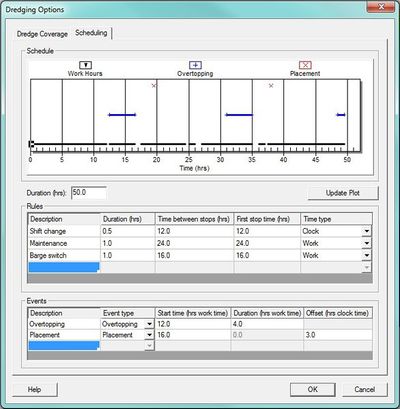SMS:Dredging Scheduling: Difference between revisions
No edit summary |
No edit summary |
||
| (One intermediate revision by the same user not shown) | |||
| Line 1: | Line 1: | ||
{{ | __NOINDEX__ | ||
{{SMS Deprecated Feature}} | |||
[[File:586px-Dredging_Scheduling.jpg|thumb| | [[File:586px-Dredging_Scheduling.jpg|thumb|400 px|Dredging Scheduling tab]] | ||
Dredges operate on schedules that are impacted by things such as crew changes, equipment maintenance, barge switch time, travel to and from placement site. To help the user determine the time intervals during which the dredge will be operating, as well as determine when overtopping and placements will occur, there is a Scheduling tab in the Dredging Options dialog. | Dredges operate on schedules that are impacted by things such as crew changes, equipment maintenance, barge switch time, travel to and from placement site. To help the user determine the time intervals during which the dredge will be operating, as well as determine when overtopping and placements will occur, there is a Scheduling tab in the Dredging Options dialog. | ||
Latest revision as of 15:13, 7 June 2019
| This contains information about features no longer in use for the current release of SMS. The content may not apply to current versions. |
Dredges operate on schedules that are impacted by things such as crew changes, equipment maintenance, barge switch time, travel to and from placement site. To help the user determine the time intervals during which the dredge will be operating, as well as determine when overtopping and placements will occur, there is a Scheduling tab in the Dredging Options dialog.
Rules The rules spreadsheet is used to enter in the different scheduling rules (i.e. shift changes, maintenance). Each rule needs the following data:
- Duration (hrs) – the length of the break
- Time between stops (hrs)
- First stop time (hrs)
- Time type – specify if the rule is dependent on the clock time or the work time.
- Clock Time – not dependent on whether or not the dredge was operating
- Work Time – the duration of time during which the dredge was operating
Events There are two types of events that can be entered in the Scheduling tab: overtopping and placements. Overtopping requires the following data:
- Start time – the amount of work time that must take place before overtopping can occur
- Duration – duration of the overtopping (in work time)
Placements require:
- Start time – the amount of work time that must take place before placements can occur (this should generally be the overtopping start time + overtopping duration)
- Offset V the clock time it takes for the barge to reach the placement location and make the placement
Plot The plot can be updated at any time by using the Update Plot command.
- Black – the intervals when the dredge is operating
- Blue – the intervals when overtopping is occuring
- Red – the time a placement is made
Assumptions
- Placements of partially full barges do not occur
- The dredging schedule restarts for each dredging arc
| [hide] SMS – Surface-water Modeling System | ||
|---|---|---|
| Modules: | 1D Grid • Cartesian Grid • Curvilinear Grid • GIS • Map • Mesh • Particle • Quadtree • Raster • Scatter • UGrid |  |
| General Models: | 3D Structure • FVCOM • Generic • PTM | |
| Coastal Models: | ADCIRC • BOUSS-2D • CGWAVE • CMS-Flow • CMS-Wave • GenCade • STWAVE • WAM | |
| Riverine/Estuarine Models: | AdH • HEC-RAS • HYDRO AS-2D • RMA2 • RMA4 • SRH-2D • TUFLOW • TUFLOW FV | |
| Aquaveo • SMS Tutorials • SMS Workflows | ||
